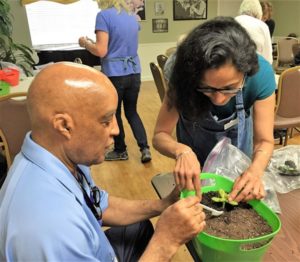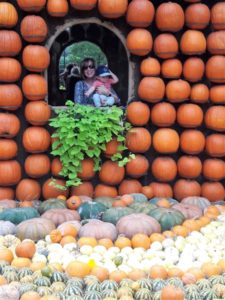As a member of the Collin County Master Gardener’s Association, I have had the wonderful opportunity to volunteer at various Horticulture Therapy events. Until I joined this organization, I had never heard of such programs. Horticulture Therapy (HT) is a wonderful way of connecting people with nature and a great way to give back to the community. I recently interviewed Jan Lain, my friend and classmate from the Master Gardener Class of 2015. She is a Project Leader and facilitates several HT workshops in the Dallas, TX area.
Q: Hi Jan, what is Horticulture Therapy?
A: Horticulture Therapy is based on the approach of involving people in plant or gardening experiences to improve their minds, bodies, and overall well-being. In nutshell, we are connecting people with plants.
We typically work with older adults and special needs people to engage them in gardening activities that promote many beneficial results: creativity, relaxation, socialization, memory improvement, problem solving, learning new skills, improved motor skills, and personal achievement. We do this by helping each participant create a miniature garden that they learn to establish and care for on an ongoing basis. At the end of the day, each person has a therapeutic garden of their own that they can take with them, share with others, care for, and monitor progress. HT focuses on achieving well-being through working with and caring for plants.
There are organizations, such as the American Horticulture Therapy Association, that create much larger therapeutic gardens. These are plant dominated environments purposefully designed to facilitate the healing elements of nature on a broader scale, and can be healing gardens, enabling gardens, rehabilitation gardens, and restorative gardens. In this type of setting, participants help design, plan, establish, and maintain the garden.
Q: How is HT different from other types of therapies like animal therapy?
A: HT is different from other therapies in that anyone can do it! You don’t have to have years of specialized training, special equipment, or a large monetary investment to participate. The materials are easily and readily accessible just about anywhere, and, with some basic instruction, you can practice HT on your own or in a group setting. You can work with plants inside using container gardens, or outside on a larger scale, so the therapeutic benefits can be realized year round. And, it isn’t necessary to meet program qualifications with certain physical or mental limitations in order to participate or join an activity.
Q: What drew you to help people using this therapy?
A: Like many people, I had to find a way to cope with the stress that comes with a balancing a career, family, and social life. You would find me in my garden quite often, as it was always a place of calm reflection that gave me a sense of well-being and accomplishment. The stress of daily life is hard to cope with, just as it is. Add to that the physical and mental problems that can come with aging, or a special needs lifestyle, or physical limitations, and you have a perfect opportunity to introduce HT.
Once I retired, I wanted to find a way to work with people that incorporated my love of gardening. My experience has been that no matter how much time and effort you put into preparing for a HT event, you always get more out of it than you put in.
Everyone is on a level playing field when it comes to participating in a HT event. Your background, abilities, limitations, your age, what you are wearing, what kind of car you drive, etc. are completely irrelevant. Plants really don’t care about these things, and once the barriers are down, the healing and peacefulness begins.
Q: What are some of the types of HT that are practiced in the US and other parts of the world?
A: HT is used in many parts of the world to achieve therapeutic benefits when treating dementia, aging, depression, drug and alcohol recovery, PTSD, physical rehabilitation, autism, mental health recovery and stimulation, and prison rehabilitation. For more information and details, go to the Horticultural Therapy Network website.
Q: Tell us a couple of your most touching and rewarding moments
A: It is rewarding to work with people who enjoyed their own gardens in the past, but don’t have a way to garden anymore. You also meet people that are not too sure about getting their hands dirty, but would like to try something new. Many times, a memory will be jogged when an adult day care patient with dementia or memory issues makes a miniature garden. For example, a man recalled a time when he had given flowers to his wife, and how he planned to give the miniature garden he had just made to her for Valentine’s Day. Another woman, who had been an avid gardener, told me about her vegetable garden, and how she would harvest and put up produce for her family every year.
A blind woman at an assisted living center had no trouble whatsoever creating her miniature garden. Once she became familiar with what she had to work with, she established her garden and learned the names of the plants and how to care for them. It just so happened that the next day was her 12-year-old granddaughter’s birthday, and she did not have a gift for her. The woman was glowing, and so excited to be able to give her granddaughter the garden as a birthday gift!
Q: Where and how are you involved in HT in the Dallas-Fort Worth Metroplex?
A: HT is a community service offered by the Collin County Master Gardeners Association. As a member, I co-lead the HT program with 2 other ladies that work with me in Collin County. We are working to expand our program to increase a special needs focus, and currently host about 15 events per year in Collin County. We typically serve Adult Day Care and Memory Centers, Assisted Living Facilities, Special Needs Teens and Young Adults Programs and Camps, Adults with Autism, and Rehabilitative Centers.
Each person that participates makes a miniature garden. They work with simple plants, usually succulents, and small garden components. They learn about their plants, and how to care for them. They plan their garden regarding the placement of plants, fences, gnomes, birds, gazing balls, and gardening tools. They ‘dig’ in the dirt with their plastic spoons and talk to their neighbors about what they are creating. They recall memories and tell us stories while they are proudly showing off their gardens. We discuss finding a sunny spot for the garden and how to know if it needs to be watered.
Q: How can someone get involved in this type of activity?
A: There are several resources available to anyone who wants to know more about HT:
- The American Horticultural Therapy Association http://www.ahta.org/
- Horticultural Therapy Institute htinstitute.org
- Horticultural Therapy Program – Growing Gardens growinggardens.org/horticultural-therapy
- Therapeutic Landscapes Network healinglandscapes.org
- Horticultural Therapy Resources – books and videos hort.vt.edu/HUMAN/HTresources.html
- Caregivers and Horticultural Therapy Resources accessiblegardens.org/horticultural-therapy-resources/
- Horticultural Therapy Network horticulturaltherapynetwork.org
My name is Jan Lain. My husband and I live in McKinney, Texas. We have 3 adult sons, one beautiful daughter in law, and one amazing grandson! I retired in 2015 from a professional career in finance in both Corporate America and Corporate Britain. Since retiring, I have had more time to develop my lifelong interest of gardening, and explore different ways to share gardening within our community.






